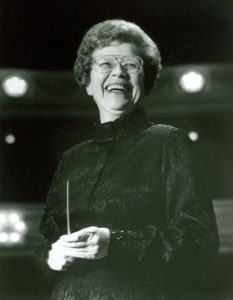Margaret Hillis in 1978, Terry’s Photography
“There’s only one woman I know who could never be a symphony conductor, and that’s Venus de Milo.” Margaret Hillis
I first learned about the new biography of Margaret Hillis (Margaret Hillis: Unsung Pioneer, Cheryl Frazes Hill, GIA Publications, Inc., Chicago, 2022) last spring. I quickly pre-ordered it from Amazon, excited because anyone who’s anyone in the Chicago choral scene knows about Margaret Hillis. Or think they know about her, and what her contributions were to our choral art. After reading her biography, I can tell you with certainty we’ve known only a portion of her extraordinary life. There’s more, much more, to her life and to her legacy.
The author, Dr. Cheryl Frazes Hill, is the director of choral activities at my alma mater, Chicago College of Performing Arts, Roosevelt University and I occasionally sing in the alumni chorus. I know Cheryl, and we’ve spoken a few times about her book. And with all candor, several of my very dear friends and teachers sang with Ms. Hillis, so perhaps my review will be colored with those associations, both past and present. I always try to be objective when I review something, but it might be difficult in this case.
Unsung Pioneer is not just a biography but an interesting history, both of an American original and of our choral art, with noteworthy appendices at the end. Overcoming barriers, rising above adversities and prejudices, Ms. Hillis’s story is one of determination and resilience, made that much more remarkable because of the era in which she lived. As a lesbian woman, it is even more amazing she was able to achieve what she achieved during her lifetime.
Thoughtfully written, Dr. Cheryl Frazes Hill has an insider’s perspective, since she was both one of her singers and a colleague of Ms. Hillis for about twenty-two years. Her insight and inclusion of many of Ms. Hillis’s wit and wisdoms (including the epigram at the beginning of this blog post), as well as comments by Hillis’s friends and colleagues, gives a personal slant on a larger-than-life choral giant. The appendices at the end of the book are extraordinary and it is evident much time and thought were given in their inclusion.
A child of privilege growing up in Kokomo, Indiana, Margaret Hillis’s early life story reads like a novel. Coming from a family of industrialists and politicians, much of what she learned by observing as a child is clear in her later professional behavior. Never letting others know what she was thinking or feeling unless doing so would make a difference, held her in good stead in situations noted in later chapters.
A short history of professional choruses, beginning in the late 19th century and continuing until Margaret Hillis herself arrived in New York City, ends the section of her early life and before her training with Robert Shaw. Along with a historical perspective of women pursuing professional music careers of any kind, it was quite interesting to me the last section of this chapter was titled “Female Conductors Find a Way.” Because that’s what seems important to note; Margaret Hillis found a way around barriers and created her own ensembles and culture to achieve what she knew she was capable of achieving.
At the end of the book, there are quite a few resources, including her method of score marking, which make Unsung Pioneer not just an interesting biography or historical perspective of professional choruses in the United States but an excellent reference book for any serious choral professional. I learned Ms. Hillis’s method of score marking from one of my undergrad professors, Doreen Rao, and it has been very helpful in my own work and know it could be useful for others. If you are stumped on what to get a choral colleague for the holidays, Margaret Hillis: Unsung Pioneer, will be a wonderful gift!
We often think of women in classical music in the present day as those who forge ahead, despite their gender. Ms. Hillis was the true trailblazer for all of us who follow. We must not forget those who came before, and I think to a certain extent, we’ve forgotten about Ms. Hillis. We are not where we should be, as far as parity with our male conductor counterparts, and the real life-story of Margaret Hillis is a good place to begin to understand why. Her legacy will be for those of us in the 21st to learn from her example and continue with the work.
Dr. Cheryl Frazes Hill will be retiring from her position as Director of Choral Activities at Roosevelt University this December and her last concerts will be next Thursday and Friday. I’ve included a link to information about those concerts. I hope those of you in the Chicago area will think about attending. I’ll be singing in the combined choruses too!
https://www.roosevelt.edu/news-events/events#!view/event/date/20221208/event_id/116434



Leave a Reply
You must be logged in to post a comment.